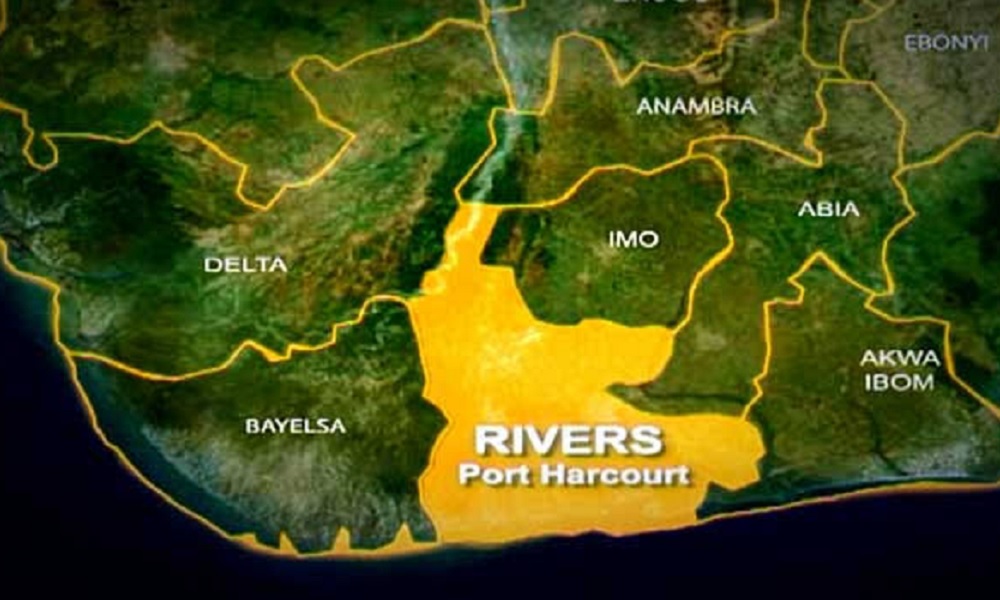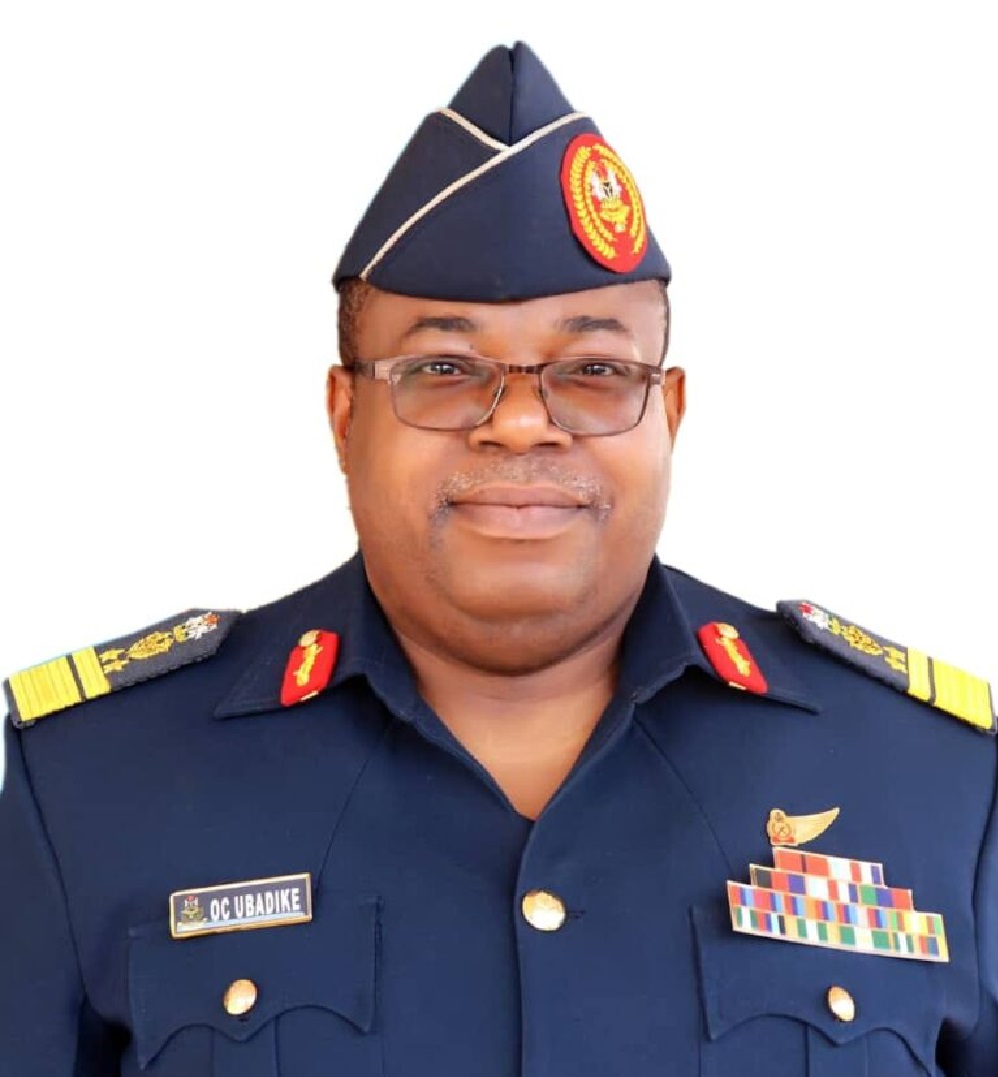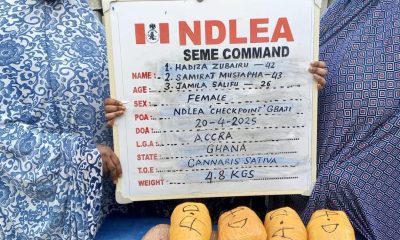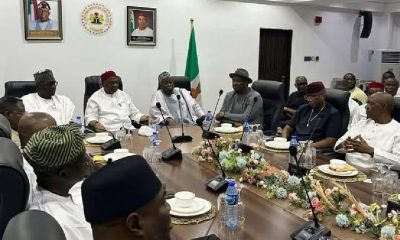News
Abuja residents in trouble as Doctors begin three-day strike

The Association of Resident Doctors, Federal Capital Territory Administration (ARD- FCTA) has commenced a three-day warning strike over unpaid salaries, allowances, and other demands.
The strike has disrupted activities in government hospitals in Abuja.
The President of ARD-FCTA, George Ebong, announced the commencement of the strike during a press briefing in Abuja on Wednesday.
Mr Ebong decried the neglect of hospitals and doctors’ welfare in the nation’s capital.
He noted that doctors in Abuja have become abandoned projects, calling on the Minister of FCT, Nyesom Wike, to intervene to avoid an indefinite shutdown of hospital activities.
He explained that the strike stemmed from a congress decision held on Tuesday, where the association expressed dissatisfaction with the government’s failure to meet previously agreed- upon demands, despite multiple dialogues.
“The three-day strike is being implemented across all government hospitals in Abuja. From Wuse to Asokoro, Maitama, Kubwa, Zuba, Kwali, Abaji, and Nyanya, and other hospitals in Abuja,” he said.
He said the association gave the government an ultimatum to meet its demands, after which they met and dialogued on several occasions.
He, however, said nothing has been done, not even the minimum thing.
The resident doctors comprise the bulk of medical personnel in Nigeria’s tertiary hospitals; hence health activities are mostly crippled when they are on strike.
Key grievances
Among other unresolved issues is the six months of unpaid arrears for doctors.
“We expected them to pay for the six months of unpaid arrears to doctors. Honestly, doctors have been abandoned projects,” he said.
Mr Ebong said the promises made on accoutrement allowance had not been fulfilled.
“This allowance, meant for the tools we use daily to serve Nigerians, has also been delayed indefinitely. Management assured us this money can be paid, but to date, nothing has been done,” he said.
He explained that these broken promises make it harder for doctors to trust the system.
The association’s president added that doctors who have been promoted are still receiving salaries based on their previous positions, despite having assumed more responsibilities for years.
“Imagine passing a promotion exam years ago, in our case 2-5 years, taking on the responsibilities of your new role, but still being paid for your old position,” he said.
“This is our reality. Doctors who have earned the title of “consultant” are still treated as senior registrars, with no formal recognition or financial benefits. It is a slap in the face to our hard work and commitment.”
He also highlighted the unmet promise of increased hazard allowances, which were approved following the increased risks of diseases like COVID-19 and Lassa fever.
He said the doctors in FCT are still owed 13 months of arrears.
Mr Ebong noted that if nothing is done regarding the doctors’ demands after the three-day strike, they will conduct an appraisal.
“If nothing is done, we will go on an indefinite strike. We want the Minister of FCT to solve this problems to avert an indefinite shutdown of the hospitals in Abuja,” he said.
Read the full communique:
ARD FCTA EMBARKS ON 3-DAY WARNING STRIKE—A CALL FOR URGENT ACTION*
Good day, ladies and gentlemen of the press,
We stand here today, not with joy but with heavy hearts. We, the Association of Resident Doctors, Federal Capital Territory Administration (ARD FCTA), have been left with no other choice but to embark on a three-day warning strike. This decision was not made lightly. It comes after countless meetings—formal and informal—with those in positions to resolve these issues. Despite our efforts, these problems remain unresolved, forcing us into this position to draw attention to the plight of doctors and, ultimately, the Nigerian healthcare system.
Our story is one of perseverance amidst hardship, but there is only so much one can bear.
Unpaid Salaries (1–6 Months): A Breach of Trust
It is painful and deeply disheartening that in the capital city of Nigeria, the heartbeat of our nation, doctors are being owed salaries for up to six months. Think about that. Six months of working tirelessly, day and night, with no pay. Many of our colleagues have resigned, not because they want to leave, but because they’ve been pushed to their limits. They’ve left for other countries, seeking dignity and survival.
We are already struggling with a manpower shortage—one doctor is often forced to do the work of five. Yet, instead of easing our burden, the system keeps pushing us to the brink. Those who remain are mocked for staying. But how can we stay when we can’t afford rent, school fees, or even food?
Medical Residency Training Fund (MRTF): A Right, Not a Favour
The MRTF is meant to assist resident doctors with the enormous cost of professional exams, which can run into millions of naira. Yet, here in the FCT, we are still struggling to receive the fund for 2024, while other centres are already preparing to receive their 2025 allocation. This fund is not a luxury—it is a necessity that helps doctors improve their skills for the benefit of their patients.
When will we stop treating basic entitlements like privileges?
Accoutrement Allowance: Promises Unfulfilled
This allowance, meant for the tools we use daily to serve Nigerians, has also been delayed indefinitely. Management assured us this money can be paid, but to date, nothing has been done. These broken promises make it harder for us to trust the system.
Conversion: Denying Our Worth
Imagine passing a promotion exam years ago, in our case 2-5 years, taking on the responsibilities of your new role, but still being paid for your old position. This is our reality. Doctors who have earned the title of “consultant” are still treated as senior registrars, with no formal recognition or financial benefits.
It is a slap in the face to our hard work and commitment. How do we encourage doctors to stay and train in Nigeria under such conditions? Is it any wonder that so many are leaving for countries where their skills are valued?
Unpaid Hazard Allowance: Neglecting Our Sacrifice
Since 2021, there was an increase in our hazard allowance—an increase approved due to the high risks we face daily. From COVID-19 to Lassa fever, we work on the frontlines, often at great personal risk. Yet, here in the FCT, we are still owed 13 months of arrears.
Is this how we show gratitude to those who put their lives on the line?
Manpower Shortage: A Recipe for Disaster
Doctors are leaving Nigeria in droves, and yet no effort is being made to replace them. This has left the rest of us overworked, burnt out, and struggling to keep the system afloat. We are losing colleagues to stress and exhaustion. We can’t continue like this.
Replacing doctors as they leave is the bare minimum. Without urgent action, our healthcare system will collapse.
THE TRUE STATE OF OUR HOSPITALS AND WHY WE CAN’T CONTINUE THIS WAY:
We have the skills, knowledge, and dedication to deliver excellent healthcare. We have some of the best-trained brains in the medical field. But the truth is, we are working under conditions that are nothing short of appalling.
Hospitals in Decay, Working With Outdated Equipment
Our hospitals are struggling to function with equipment that should be in museums, not in operating rooms. Many of the tools we use were purchased decades ago—some from when I was still in my mother’s womb. They’ve seen no updates, no replacements, and minimal maintenance.
Doctors have now become technicians. We spend as much time fixing broken operating tables and machines as we do saving lives. Oil is constantly applied to squeaky operating tables to keep them functional. Our theatres are held together by improvisation. Our wards are even worse off, with no BP apparatus, not even little things like thermometers or weighing scales, not to mention ventilators and the like.
This is the Federal Capital Territory, yet our hospitals lack basic amenities. Equipment fails mid-procedure, jeopardising lives. How can we offer modern healthcare with tools that belong to a bygone era?
Overcrowding and Burnout: A Recipe for Disaster
Hospitals built to handle 50 beds are now forced to accommodate hundreds of patients daily. Imagine a facility seeing over 5,000 patients a month, performing more than 100 Caesarean sections monthly, with just one consultant and two to three medical officers in the department.
This is beyond capacity, yet doctors are expected to keep pushing. The system is stretched thin, and so are we. When there are no beds, no power for surgeries, no consumables, and no drugs in the pharmacy, patients understandably grow frustrated. But the blame unfairly falls on doctors when it is the government’s failure to provide these essentials.
Hospitals Without Water: A National Embarrassment
Perhaps one of the most shameful realities is that some hospitals in the heart of Abuja—the seat of power—have gone months without water. Yes, you heard that correctly: no water to clean operating rooms, wash hands, or even flush toilets.
Members of our association have shared heartbreaking stories of being forced to defecate or urinate in isolated areas of the hospital because there was no other option. This is not just humiliating—it is a public health hazard. How do we protect ourselves and our patients from deadly diseases when we cannot access something as basic as water?
Doctors Carrying the Burden of a Broken System
Despite these horrendous conditions, we show up every day to do our best. We work long hours, sacrificing our own health and well-being, only to face criticism and blame for systemic failures. When we tell patients there’s no bed, no equipment, or no drugs, the response we often hear is, “Doctors are wicked.”
But let me ask: are we the ones who should be providing beds, light, consumables, and medications? Or is it the government’s responsibility?
The Toll on Our Mental and Physical Health
Doctors are humans too. We are tired, burnt out, and demoralised. We work in an environment where the odds are stacked against us, and no one seems to care. We cannot continue like this.
A Call for Urgent Action
We are striking because we have no other choice. This is not just about salaries or allowances—it is about ensuring that our hospitals can function, that we can work with dignity, and that patients can receive the care they deserve.
We Are Not Fighting for Luxuries, but Survival
Many believe doctors are always demanding money, but this is not about greed—it’s about survival. No Nigerian can go six months without pay. No professional should work 36-72 hour shifts without rest because there are no replacements.
Doctors are human too. We face the same struggles as every Nigerian—rising costs of living, school fees, and basic family needs. How can we care for others when we are unable to care for ourselves?
A Plea to Nigerians
We are not the enemy. This fight is for all of us. A broken healthcare system affects everyone. Before asking us to “consider the poor masses,” we ask you to consider that we are also part of the poor masses.
Our hope is that this warning strike will force the authorities to act. We cannot continue to suffer and smile.
To the public, we plead for your understanding and support. To the government, we demand urgent action. The time to act is now, before it is too late.
Nigerians deserve better. Doctors deserve better.
Thank you.
Dr. George Ebong
President, ARD FCTA
Premium Times
News
FG warns against growing threat of cyber-slavery in West Africa

The Ministry of Foreign Affairs on Sunday raised the alarm over the growing threat of cyber-slavery in West Africa, which is increasingly targeting vulnerable young Nigerians.
In a statement signed by Mr. Kimiebi Imomotimi Ebienfa, spokesperson for the ministry, it was revealed that many young Nigerians, including underage teenagers, are being lured out of the country with false promises of lucrative job opportunities abroad, especially in crypto-related operations.
The warning comes after the recent rescue of about 231 Nigerians who were forced into cybercrime activities in Accra, Ghana.
The victims were rescued and are currently in the custody of the Economic and Organised Crimes Office (EOCO) in Accra.
The government said, “In reality, these individuals are trafficked into sophisticated scam operations and enslaved to work in criminal “call centres” — often referred to as “419 cyber-scam factories.” There, they are forced under coercive and inhumane conditions to send thousands of fraudulent emails, text messages, and calls aimed at defrauding victims worldwide.
“This incident highlights the severe exploitation and abuse associated with cybercrime operations. It also underscores the need for enhanced efforts to combat such multibillion-dollar criminal networks and mitigate the susceptibility of victims.”
The Ministry therefore warned Nigerians, especially the youths and parents, to exercise utmost caution when presented with job offers, particularly those promising easy money, overseas travel, or remote work involving cryptocurrencies.
“Nigerians are therefore advised to verify all employment offers through official channels and report suspicious cases to relevant authorities for necessary investigation and action to curtail the activities of the perpetrators.
“The Ministry wishes to assure the general public that, as a precautionary measure to address this unfortunate situation, the Federal Government is working closely with regional partners, law enforcement agencies, and international organizations to tackle this heinous crime, rescue victims, and bring perpetrators to justice.
“The Ministry remains committed to protecting Nigerian citizens at home and abroad and will continue to raise awareness about emerging threats to the welfare and dignity of our people,” Ebienfa further stated.
News
Rivers pledges support for socio-economic progress, youth development

The Rivers State Government has reiterated its commitment to strategic partnerships and collaborations aimed at enhancing economic growth through sustainable investments.
Also, the state government pledged its continued support for initiatives that drive socio-economic progress and youth empowerment.
The Rivers State Administrator, Vice Admiral Ibok-Ete Ibas (retd.) stated this during a meeting with the leadership of the Unity Schools Old Students Association led by its President-General, Michael Ibrahim Magaji, at Government House, Port Harcourt, on Sunday.
This was contained in a statement issued by the Senior Special Adviser to the Sole Administrator, Hector Igbikiowubo, and sent to newsmen.
The visit followed the successful conclusion of the 3rd USOSA Sports Festival hosted in the State, an initiative designed to promote unity, cultural legacy, and societal impact.
Ibas commended USOSA for choosing Rivers State as the host of the event, describing it as a testament to the state’s peaceful and investment-friendly environment.
He emphasised that the government remains committed to fostering collaborations that stimulate economic benefits while advancing education and sports as key drivers of youth development and social cohesion.
The statement reads, “The Rivers State Government is open to partnerships and collaborations that enhance economic growth through enduring investments.
“We recognize that initiatives like the USOSA Sports Festival not only promote unity but also contribute to the socio-economic vitality of our State. We will continue to support such programs that harness youth potential, create opportunities, and reinforce our collective belief in a prosperous Nigeria.”
Ibas further highlighted the government’s prioritization of education and sports, noting their role in shaping a stable and progressive society.
He assured USOSA of the state’s willingness to consider interventions in unity schools within Rivers State, aligning with the administration’s broader agenda for human capital development.
In his remarks, USOSA President-General Michael Magaji expressed gratitude for the state’s hospitality and reiterated the association’s commitment to fostering national unity through education and sports.
He appealed for government support in rehabilitating facilities in unity schools across the state, a request the administrator pledged to review.
News
NAF gets first serving professor of aerospace engineering

The Governing Council of the Air Force Institute of Technology, has approved the appointment of AVM Osichinaka Ubadike, a serving officer, as Professor of Aerospace Engineering.
This is contained in a statement by the Director, Public Relations and Information, Nigerian Air Force, Air Commodore Ehimen Ejodame, on Sunday in Abuja.
Ejodame said the appointment was a landmark achievement for the NAF and a major boost to its research and development endeavours.
This, according to him, makes Ubadike the first-ever serving officer in the NAF to be conferred the rank of Professor.
“AVM Ubadike, an accomplished scholar and military professional, holds a PhD and Master’s degree in Aerospace Engineering and Aerospace Vehicle Design from the esteemed Cranfield University in the United Kingdom.
“He also possesses 3 other Masters degrees from Ahmadu Bello University and Nigerian Defence Academy (NDA), with a First-Class Bachelor of Electrical Electronics Engineering degree from NDA.
“He has led several cutting-edge research initiatives within the NAF, including his pivotal role in the development of the indigenous NAF Unmanned Aerial Vehicle (UAV).
“The UAV project demonstrates the Air Force’s expanding technical capabilities and strategic independence,” he said.
Ejodame said the AFIT Governing Council also confirmed the appointment of retired AVM Paul Jemitola, as a Professor of Aerospace Engineering.
He said that Prof. Jemitola, the immediate past Commandant of AFIT, was widely respected for his expertise in multidisciplinary and multi-objective aircraft design optimization.
“He holds a Master’s degree and PhD from Cranfield University and was the lead designer of the NAF UAV project.
“He is a chartered engineer in the United Kingdom and currently serves as the Acting Vice Chancellor of Isaac Balami University of Aeronautics and Management, Lagos,” he added.
The NAF spokesman said the conferment of the professors was a testament to the vision of the Chief of the Air Staff, Air Marshal Hasan Abubakar, to prioritise technological advancement through education, capacity-building and R&D.
He quoted CAS as saying, “We will continue to invest in the empowerment of our flagship training and capacity development institutions to progressively minimise dependence on foreign expertise”.
Ejodame said the approach reaffirmed the NAF’s commitment to academic excellence and R&D to cultivate homegrown expertise capable of meeting evolving national security and aerospace challenges.
NAN
-

 News23 hours ago
News23 hours agoDSS arrests Army major for planning unrest in Delta
-

 News23 hours ago
News23 hours agoFCT minister, Wike announces new appointments
-

 News15 hours ago
News15 hours agoGunmen abduct two senior LG workers, three others
-

 Politics23 hours ago
Politics23 hours agoSee list of APC Delta stakeholders holding meeting in Abuja on power sharing formula with Oborevwori
-

 News23 hours ago
News23 hours agoCOVID-19 Vaccine Killed Pope Francis, says Pastor Oyakhilome
-

 News17 hours ago
News17 hours agoNDLEA storms Lagos hotel, recovers N1.042billion illicit drug consignments(Photos)
-

 News16 hours ago
News16 hours agoArmy Chief condemns beating, harassing civilians in military uniform says, it’s wrong
-

 News23 hours ago
News23 hours agoOborevwori absent as Delta APC leaders meet with Uzodinma in Abuja


















